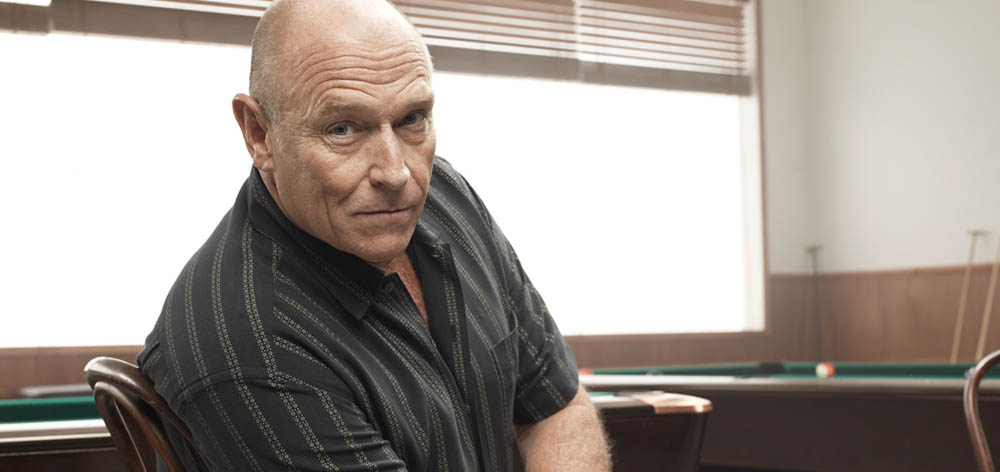
For eight seasons and a movie, Henry Spencer (Supa-Star Corbin Bernsen) was the grumbly glue that kept Santa Barbara’s renowned Psych detective agency together.
Sure, his precocious, faux-clairvoyant son, Shawn (James Roday), was the heart of the operation. And Shawn’s lifelong best friend and business partner, Burton ‘Gus’ Guster (Dule Hill), was the brains (and the nose). But Henry – a cantankerous, ultra-disciplined ex-cop whose gruff exterior belied a heart of gold – Henry was the glue.
If you’re not familiar, Psych follows the adventures of fake-psychic detective Shawn Spencer and his frequently reluctant partner in crime-fighting, Gus – aka Ovaltine Jenkins, Ghee Buttersnaps and 90-something other aliases – as they crack wise, tease The Mentalist and solve murders as freelance consultants for the Santa Barbara Police Department.
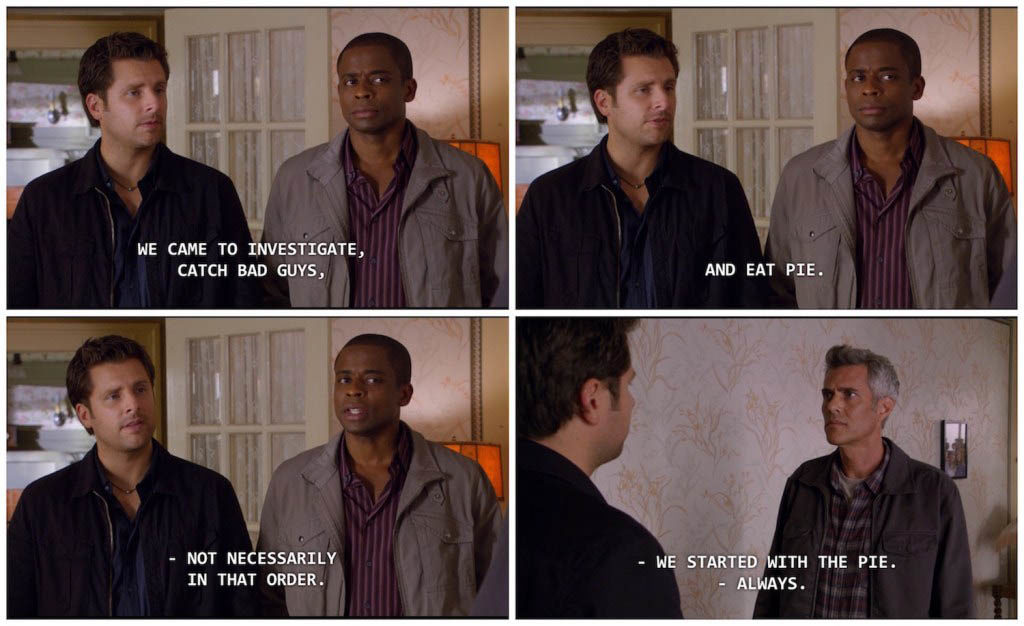
That’s it. That’s the show. (Photo: USA Network/Allspice & Ally)
Following their successful first case, the pair’s ongoing presence at the SBPD continues much to the varied chagrin and scepticism of head detective Carlton ‘Lassie’ Lassiter (Timothy Omundson), his more open-minded partner Juliet O’Hara (Maggie Lawson), and their results-driven police chief Karen Vick (Kirsten Nelson). But beyond its straightforward procedural framework, the mystery-comedy-drama is also an absolute treasure trove of ‘80s and ‘90s pop-culture easter eggs, references and homages, and, frankly, was sorely underappreciated in its time.
At the series’ outset, there is no reason to expect that Henry would even have a part to play in the titular agency, much less a crucial one. In the space of the first hour, it’s made clear that not only are Shawn and Henry estranged – the pair having fallen out following Henry’s divorce from Shawn’s mother, Madeleine (Cybill Shepherd), prior to the series – but Henry seems to actively dislike his son, and vice versa.
In fact, on finding out that Shawn is, after years of itinerant employment and unreliable behaviour, seriously pursuing a career as a psychic detective, Henry tells him, “When I was in the department, there were two things I hated in this world: private investigators and psychics. Congratulations, kid. You just hit the disappointment exacta.”
This disappointment, as Bernsen has previously noted in interviews, stems from the fact that Henry had long held hopes that his incorrigibly delinquent son – who, by the way, has an eidetic memory, aiding him greatly in his ‘psychic’ charade – would shape up and follow in his straight-and-narrow footsteps as a police officer. This was a dream scuttled before Shawn was out of his teens, however, when he – still rebelling against his father for divorcing Madeleine – stole a car with the express intent of gaining a criminal record, thus disqualifying him from future service. And, to add insult to injury, Henry was the one who made the arrest.
Still, before this moment, Henry put in a lot of work towards training Shawn’s mind to prepare him for a future in the force. In fact, most of the show’s episodes begin with (or otherwise utilise) flashbacks to Shawn’s childhood, recounting how Henry imparted his detective’s wisdom and keen observational skills to his progeny. Sure, it was usually through some insane lesson – such as the time he locked his unsuspecting preteen son in the trunk of a car to teach him how to escape from one – but, to be fair, that lesson actually ended up being incredibly useful for Shawn as an adult; they usually did.
However, far from being just a militant man-of-the-house type, Henry, it turns out, is a man of many layers, and – despite his withering assessment of psychics and private eyes – he begrudgingly assists Shawn with his first case, even going so far as to straight-up lie to Chief Vick and say that Shawn’s psychic ‘gift’ first manifested when he was a teenager, lending credence to the whole story. Between his rigorous training and this gesture of legitimacy, it starts to become obvious that, without Henry, there would be no Psych detective agency.
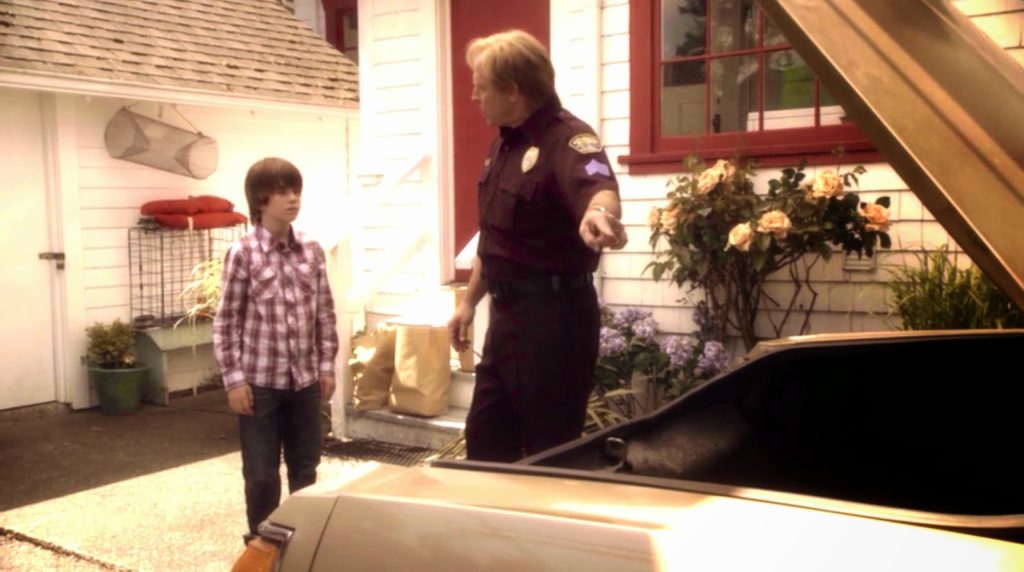
This is still questionable parenting, though. (Photo: USA Network)
Even though he tells his son that his help is a once-off (and still seems pretty miffed about the whole deal), the eagle-eyed Shawn spots a newspaper, detailing the budding detective’s involvement in solving the mystery, sitting in the passenger seat of his father’s truck. This betrays the elder Spencer’s pride that, at long last, his wayward child is at least doing something right, even if he thinks it’s in the entirely wrong way.
As you might have guessed, Henry’s involvement with Psych only grows from there. Far from being an anomalous occurrence, he lends his wisdom and guidance to Shawn on an almost weekly basis. Though still possessing a lingering air of disapproval about it all, Henry nonetheless makes himself available for his son, whether by providing a fresh perspective on a case, having evidence tested by an old colleague, or even providing safe haven for an obnoxious reality-show judge (Tim Curry, in a wonderful guest appearance) who is being targeted by a killer.
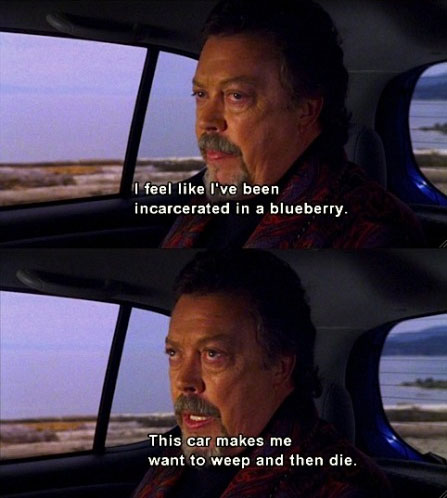
Like… you can see why. (Photo: USA Network/Tumblr)
Occasionally, he even gets directly involved with Psych’s work – sometimes unwittingly, as when Shawn and Gus investigate the disappearance of a resident at an exclusive retirement home and use Henry’s pride against him to trick him into checking in (and thus gain visitors’ access for his ‘grandsons’ to do their work).
And, at the beginning of season three, when Madeleine, a police psychologist, returns to Santa Barbara to conduct evaluations at the SBPD, Shawn finds out that it was his mother who left Henry – not the other way around, as he had long believed – and their bond deepens further as the younger Spencer sheds decades of resentment against his father for something, he realises, he actually didn’t do.
Henry’s involvement in Shawn’s life and detective work is heightened further at the end of the show’s fourth season, when Henry takes a role as the official SBPD liaison to outside consultants – i.e. Psych. Beyond the precinct, Henry provides fatherly advice to Shawn with respect to his personal life, arguably giving Shawn the push he needs to make known his long-harboured romantic feelings towards Juliet.
Naturally, the increasing interaction between father and son sees a slow but steady repairing of their relationship, with both Shawn and Henry coming to understand and care for each other on a much greater level than they ever had previously.
Well, kind of.
For example, when Shawn gets kidnapped while trying to solve a case, Henry reacts with the kind of paternal ferocity that seemed positively unthinkable at the beginning of the series, remarking that “there’s no room I won’t bust open to find my son”. Likewise, when Henry is shot by a crooked ex-colleague at the end of season six, Shawn shows emotion and concern well beyond anything his teenage, or even young-adult, self would have been able to muster for his old man.
The pair still do a fine job of shoving their feelings way, way down inside – or, in Shawn’s case, couching any genuine moment of sincerity in quips and diversions – but it’s clear that, as their bond continues to strengthen, that each tends to bring out the best in the other. Although he’d never admit it to Henry’s face, Shawn comes to see his father as his hero (a massive turnaround from his early scorn of, and resentment towards, the man) and, when Henry ultimately retires from his liaison role at the end of season six, the two even share a genuinely sweet moment – sans irony – sparked by the sight of Henry’s old police hat.
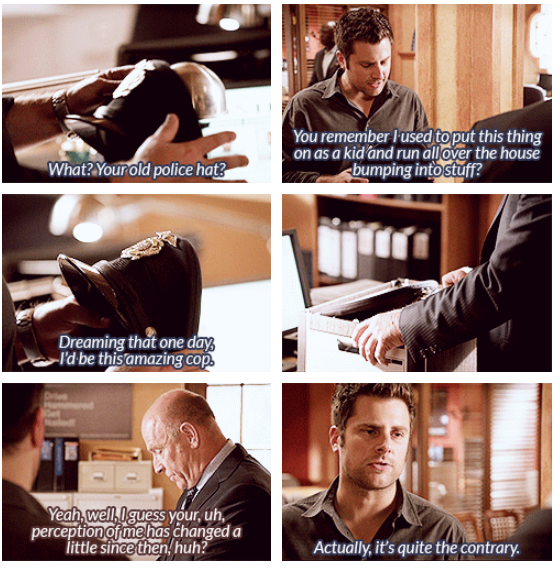
You know what that is? That’s GROWTH. (Photo: USA Network/Pinterest)
Following his retirement, Henry resumes his role as sage advisor and part-time accomplice to Shawn and Gus, routinely finding himself unable to escape their hijinks. But stepping away from the SBPD also provides him the room for some personal growth: he briefly reconciles with Madeleine, who temporarily moves back in with him to care for him after his shooting, and becomes friends with Juliet’s stepfather, Lloyd (Jeffrey Tambor), via an impromptu and exceptionally dangerous trip to Mexico.
Later, in true Henry style – demonstrating how far he’s come since he first reluctantly provided help on a Psych case – he even helps the boys clean up a crime scene after Gus, having discovered his boss has been stabbed to death, accidentally contaminates it.
By the end of the series, he’s dabbling in academia, taking a gig as a criminology professor and even bringing his students along as he helps Shawn with yet another case, in what ends up being the best – or at least their most exciting and enlightening – field trip ever. Finally, with Shawn (and Gus) relocating to San Francisco in the series finale, Henry is seen staking out measurements in the Psych office, hinting that he is likely to take over the space to use for his own purposes.
Whether he sets up his own agency or utilises the office for other purposes isn’t revealed, even when we are reunited with the characters in 2017’s Psych: The Movie, but it hardly matters. Regardless of whatever comes next (there are plans for future sequels, cast schedules permitting), given how crucial he was to Psych’s birth and continued operation over its eight-year run, if anyone deserved to inherit the physical space in which Shawn Spencer finally grew up, it’s his big ol’ papa monkey, Henry.
Corbin Bernsen will appear at Supanova Comic Con & Gaming Melbourne (6-7 April) and Gold Coast (13-14 April).









